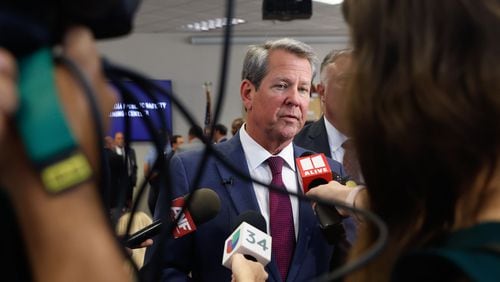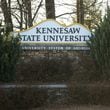Gov. Brian Kemp broke out his veto pen Tuesday, nixing legislation that would suspend sales tax breaks on new data centers and another that would reinforce a ban on foreign campaign contributions.
The Republican also rejected a measure that would increase the state homestead exemption from $2,000 to $4,000 that was pushed by House Speaker Jon Burns after the Senate version included a voter referendum that would have nullified the proposed bigger tax break.
And he vetoed a proposal to allow students to use their HOPE scholarship on graduate-level courses over concerns it would drain the lottery-funded program’s coffers by more than $25 million annually.
They were among a dozen measures rejected by Kemp on Tuesday, the end of a 40-day period to sign or nix legislation. Few of the vetoes came as a shock, though many of the measures were the focus of intense behind-the-scenes lobbying.
Just as closely watched was a measure that Kemp inked at the deadline. He signed Senate Bill 189, which establishes new rules for challenging voters’ eligibility and could allow more third-party presidential candidates on Georgia’s ballot.
He approved the measure despite intense pushback from Democrats, voting rights advocates and elections officials, who warned it could require the state to shell out tens of millions of dollars to comply with the measure’s requirement to remove QR codes from ballots.
Another fierce lobbying effort involved Kemp’s decision to veto House Bill 1192, which would have suspended sales tax breaks on new data centers that lawmakers say aren’t giving the state much financial return even as they gulp down huge amounts of energy.
While supporters of the incentives acknowledge the sprawling data centers don’t create many jobs, they appealed to the governor not to undercut an industry that has factored the credits into its business model.
Kemp’s veto noted that the tax breaks were extended only two years ago through 2031, and that even a pause would undermine “investments made by high-technology data center operators, customers and other stakeholders” that could hamper the state’s economy.
The decision was a disappointment to government watchdog groups and environmental advocacies who noted Republican leaders entered the year with pledges to review whether lucrative tax breaks aimed at specific industries were a good deal for taxpayers.
The data center legislation was one of few bills lawmakers approved to trim corporate tax breaks after most other efforts — including a measure to curtail film industry subsidies — were shut down during the session by lobbying efforts bankrolled by the beneficiaries of the state’s largesse.
”The surge in the demand for power from data centers is propping up old coal plants and causing a rush to build new gas infrastructure. As a result, Georgia communities will see higher levels of air and water pollution, and our fight to curb the worst effects of climate change is hampered,” said G Webber of the Sierra Club’s Georgia chapter.
“Kemp is burying his head in the sand by refusing to address an issue already having such a significant impact on our state.”
Kemp also rejected Senate Bill 368, which would have prohibited foreign campaign contributions. The governor noted the practice is already banned by federal law, and he said other registrations requirements on foreign nationals included in the measure were “unintended” by the bill’s sponsor.
Secretary of State Brad Raffensperger made a case for the legislation in an op-ed Monday that called it the “backbone of the most critical election security improvements that could take place before this major election.”
Kemp’s veto of House Bill 2019 noted that raising the statewide property homestead exemption on taxes from $2,000 to $4,000 required voters to approve the change in a referendum on November’s ballot.
However, during some late-session maneuvering, the Senate passed a $4,000 homestead exemption in the bill but set the exemption in the proposed referendum at $10,000, Kemp said. Because the two didn’t match, Kemp vetoed the bill.
The HOPE-related measure that Kemp killed would have allowed students who are seeking both a bachelor’s degree and their first professional degree to use HOPE to help pay for those graduate credits.
Under current law, the lottery-funded merit-based tuition scholarship expires after students have reached 127 semester hours or 190 quarter hours, or earned a four-year degree.
State Rep. Scott Holcomb, the bill’s sponsor, said he’s holding out hope a similar version will pass in 2025.
“I’m disappointed because it would have helped our state’s top students,” said Holcomb, a Democrat from Atlanta. “But I will keep the conversation going and see if we can make it work next year.”
The vetoed legislation joins a pile of measures that Kemp has rejected since he took office in 2019, including 14 bills that went in the dustbin in 2023. He also aggressively used his power to “disregard” expenditures last year, putting on hold more than $200 million in spending in the state budget.
About the Author








